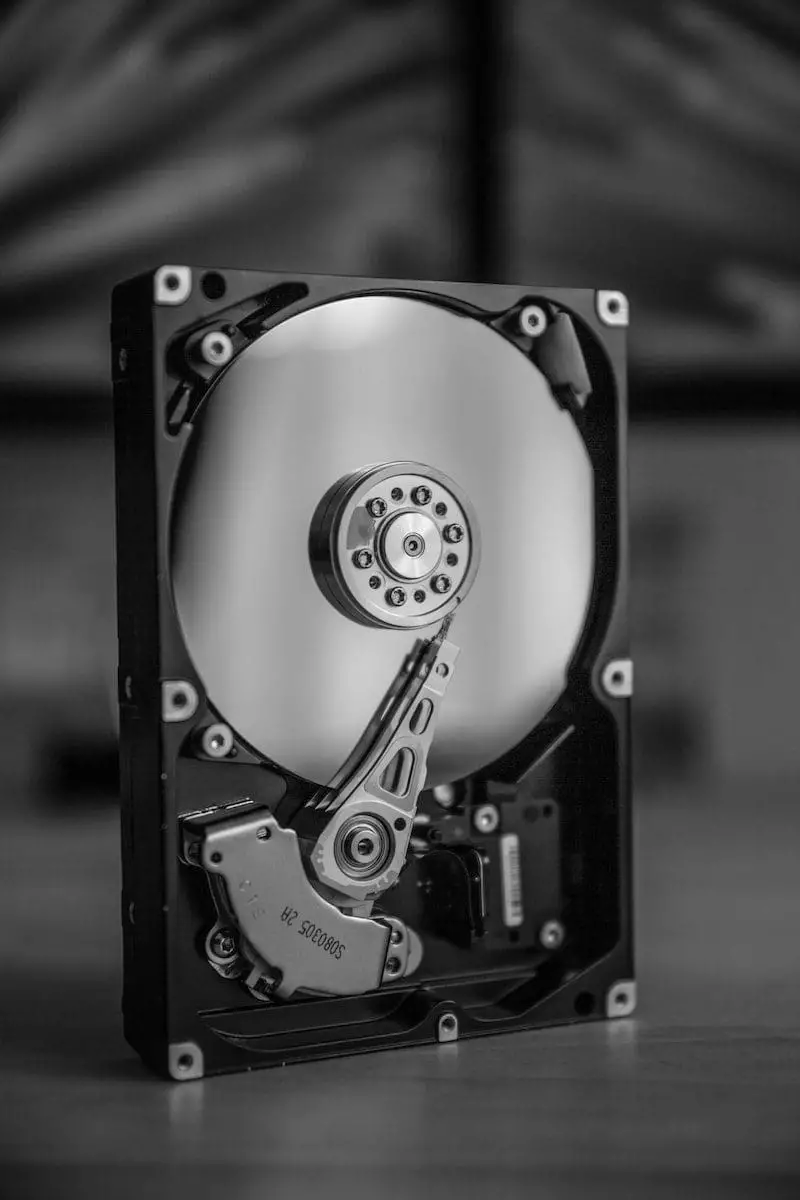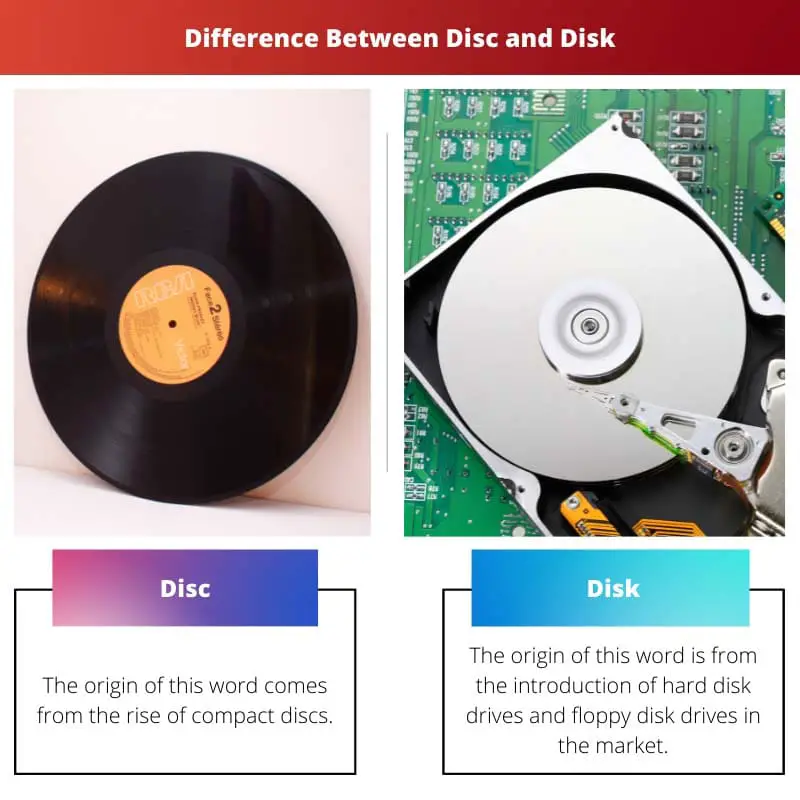Storing data is really easy today, downloading on your phone or uploading on your google drive. However, it was not that easy back then. People had to use different methods that consumed more time.
One of the two most popular methods even today is the use of Discs and Disks.
Key Takeaways
- Discs are optical storage media, such as CDs, DVDs, and Blu-ray, while disks are magnetic storage devices like hard drives and floppy disks.
- Discs use laser technology for reading and writing data, whereas disks utilize a read/write head and magnetic fields.
- Discs are more prone to scratches and physical damage than disks, but they are less susceptible to data loss due to magnetic interference.
Disc vs Disk
The difference between Disc and Disk is that disc is removable from their housing, whereas disks cannot be removed from their housing. Both terms are related to the introduction of new technology in the market. They seem similar but have other differences between them in terms of origin, rewriting references, and segments.

The disc is a term popularly used that came into existence when compact discs were launched in the market. They refer to optical media storage and are read-only, meaning they cannot be rewritten.
They are in the form of DVDs and CDs, mostly used for storing films, videos, songs, and other media.
The disk is a term popularly used that came into existence when hard drives and floppy drives entered the market.
They refer to magnetic media storage and are different types, such as ready, rewritable, and protected. However, they are irremovable from the housing as well as they can be parted.
Comparison Table
| Parameters of Comparison | Disc | Disk |
|---|---|---|
| Origin | The origin of this word comes from the rise of compact discs. | The origin of this word is from the introduction of hard disk drives and floppy disk drives in the market. |
| Reference | It is used in reference to all-optical storage media. | It is used in reference to magnetic storage media. |
| Rewrite | They are all read-only. Some of them can be written or rewritable but just once. | They are all rewritable, the only exception being write-protected or with a locked condition. |
| Removable | They are all removable from the housing. | It is not removable from the housing. |
| Segments | Optical media storage or disc segments include DVD-ROM, DVD-RAM, CD, CD-ROM, CD-RW, and DVD-RW. All of which are used for storing data. | Magnetic storage media or disk segments comprise Floppy disks as well as hard disks. Disks can be parted. |
What is Disc?
Discs are those flat and round-shaped objects which somewhat look like frisbees. They were popularly used until the launch of pen drives or the online streaming platforms that exist now having this wide range of variety of media content.
Discs, in general, are really thin and have a hole in between. They are made out of metal and glass. The primary use of discs was to store media.
This included movies, songs, and video clips or recordings taken on camera. They are also popularly called DVDs and CDs.
These DVDs and CDs can be inserted into TVs, computers, mini players, CD players, DVD players, etc. They can also be effortlessly removed from the computers or other devices that have once been done playing.
They are all mostly available in a read-only format, which means they cannot be rewritten.
The ROM files are the ones that cannot be rewritten. However, there are some exceptions in such a case. They can be rewritten but just once or multiple times. In terms of some, once a disc is rewritten, it cannot be rewritten.
They refer to the optical medium. They are majorly used by the common people and people working in the music industry.

What is Disk?
A disk refers to a magnetic medium or magnetic storage device. These are popularly very similar to floppy disks or hard drives. Its origin is also related to these two terms.
The word disk also originated from the Greek word diskos. A disk is covered in a plastic or metal case for the protection of the magnetic files on it from any kind of damage.
All disks available are, in general rewritable. However, they cannot be rewritten if the owner or administrator has locked them, in which case they are read-only.
The hard drives on the computer are the kind of discs that can be partitioned into further smaller volumes. Hard drives cannot be removed from the computer. But, the external hard drives or floppy disks can be easily removed.
The floppy disks are 3 to 5 inches long and are placed in the disk drives. The disk is a term that is popularly used in the computer language lingo rather than a common man’s language.
The rise in the use of personal computers gave rise to an increase in awareness about the difference between discs and disks. Some consider it the same as discs.

Main Differences Between Disc and Disk
- The origin of the term disc comes from the rise of the compact disc. The origin of the term disk is from the introduction of hard disk drives and floppy disk drives in the market.
- The disc is used in reference to all-optical storage media. The disk is used in reference to magnetic storage media.
- Discs are all read-only, some of them can be written or rewritable but just once. Disks are all rewritable, the only exception being write-protected or with a locked condition.
- Discs are all removable from the housing. The disk is not removable from the housing.
- Optical media storage or disc segments include DVD-ROM, DVD-RAM, CD, CD-ROM, CD-RW, and DVD-RW. All of which are used for storing data. Magnetic storage media or disk segments comprise Floppy disks as well as hard disks. Disks can be parted.

- https://pdfs.semanticscholar.org/e31a/b625ab7e2169f83947f2f949bc39c2be5f12.pdf
- http://dspace.library.uvic.ca/handle/1828/7611

Very educational and well-written article.
The comparison between optical media and magnetic storage media is very informative.
Agreed, the explanation is comprehensive and clear.
The article’s clear and detailed descriptions enhance the understanding of disc and disk technologies.
Nicely summarized and presented!
The explanation of optical media storage and magnetic storage media is concise and insightful.
I agree, the article offers a detailed overview.
This article provides a thorough examination of the technical aspects and uses of discs and disks.
The details about the storage technologies are fascinating.
The article offers valuable insights into the differences between discs and disks.
The comparison provided in the article is an excellent resource for understanding the differences between discs and disks.
The detailed explanation of disc and disk technologies is informative and easy to understand.
I agree, the article is very well-written.
The comparison table makes it easy to distinguish between the two.
Thanks for providing a thorough explanation of the differences between discs and disks, and their origins!
I appreciate the detailed comparisons too!
This comparison table is really helpful!
The historical context of discs and disks is enlightening. It’s interesting to see how technology has advanced.
Definitely, the evolution of storage technology is fascinating.
I appreciate the detailed information about the difference between read-only discs and rewritable disks.
The article does a great job of clarifying the technical aspects.